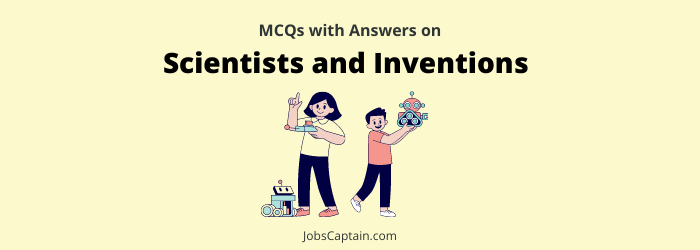
A quiz on well-known scientists and their inventions. Can you name the scientist behind each discovery?
| Test | 1 | 2 |
| Return to | Topic Wise General Awareness Quiz | |
Question 1. Telescope was invented by ________.
(A) Graham Bell
(B) Edison
(C) Gutenberg
(D) Galileo
Question 2. The microscope is used for the study of __________.
(A) Micro and nearby objects
(B) Small objects
(C) Nearby objects
(D) Distant objects
Question 3. The machine-Gun was invented by __________.
(A) James Puckle
(B) Karl Benz
(C) G. Brousa
(D) J.L. Beared
Question 4. Who invented thermoscope, an early form of thermometer?
(A) Beno Gutenberg
(B) Galileo
(C) Charles F. Richter
(D) Sir Christopher Wren
Question 5. Which is the biggest telescope of the world?
(A) Challenger
(B) Discovery
(C) Ice Cube
(D) Galileo
Question 6. Wilhelm Roentgen invented ___________.
(A) Electric Motor
(B) Electric Bulb
(C) X-Ray Machine
(D) Radio
Question 7. Who among the following scientists shared the Nobel Prize in Physics with his son?
(A) Enrico Fermi
(B) William Henry Bragg
(C) Albert Einstein
(D) Max Plank
Question 8. Who invented Steam Engine?
(A) Robert Watson
(B) William Harvey
(C) James Watt
(D) None of the above
Question 9. ‘Telephone’ was invented by _________.
(A) George Stephenson
(B) Wilson
(C) Hoffman
(D) Graham Bell
Question 10. Who discovered electric bulb?
(A) Terry Addison
(B) William Cooke
(C) Alexander Graham Bell
(D) Thomas Edison
Question 11. Gas engine was invented by ____________.
(A) Charles
(B) Daimler
(C) Davy
(D) Diesel
Question 12. Who was the inventor of the fountain pen?
(A) Shaeffers
(B) Chelpark
(C) Parker
(D) Waterman
Question 13. Who was the inventor of Radar?
(A) Austin
(B) Bush Wall
(C) Fleming
(D) Robert Watson
Question 14. Alfred Nobel invented ____________.
(A) Gramophone
(B) Dynamite
(C) Typewriter
(D) Microphone
Question 15. Who discovered Television?
(A) Franklin
(B) Baird
(C) Galileo
(D) Edison
Question 16. With what invention is the name of J.L. Baird associated with _______.
(A) Telephone
(B) Television
(C) Helicopter
(D) Barometer
Question 17. Who among the following invented Lasers?
(A) Francis Crick
(B) William Morton
(C) Denis Papin
(D) Theodore Maiman
Question 18. Which one of the following pairs is not correctly matched?
(A) J. Perkins – Penicillin
(B) J.L. Baird – Television
(C) A.G. Bell – Telephone
(D) James Watt – Steam Engine
Question 19. Who is the discoverer of Penicillin?
(A) Albert Einstein
(B) Christopher Macdonald
(C) Alexander Fleming
(D) Alexander Graham Bell
Question 20. Alexander Fleming discovered __________.
(A) Telephone
(B) Streptomycin
(C) X-ray
(D) Penicillin
Question 21. Who among the following is the inventor of ‘X’ rays?
(A) Torricelli
(B) Maxwell
(C) Roentgen
(D) Rutherford
Question 22. Who among the following gave the term ‘Nanotechnology’ and when?
(A) Sumiolijima – 1991
(B) Eric Drexler – 1986
(C) Norio Taniguchi – 1974
(D) Richard Feynman – 1959
Question 23. The principle of ‘Black hole’ was enunciated by ___________.
(A) H. Khurana
(B) S. Chandrashekhar
(C) H.J. Bhabha
(D) C.V. Raman
Question 24. Scientist S. Chandrashekhar got Nobel Prize for which field?
(A) Studies of Core of the Sun
(B) Super conductivity at low temperatures
(C) Micro-electronics in Satellites
(D) Astrophysics
Question 25. Who of the following scientists proved that the stars with mass less than 1.44 times the mass of the Sun end up as White Dwarfs when they die?
(A) Steven Weinberg
(B) Stephen Hawking
(C) S. Chandrashekhar
(D) Edwin Hubble
Question 26. Scientist Albert Einstein is famous for _________.
(A) The prediction of the existence of neutrons
(B) Planting first Nuclear Reactor
(C) The photoelectric effect
(D) The interpretation of atomic structure of hydrogen
| Test | 1 | 2 | ||||||||||
| Return to | Topic Wise General Awareness Quiz | |||||||||||
